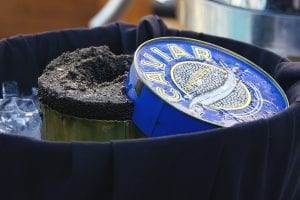10 Opulent Facts about Caviar
Even if you’ve never eaten caviar before, it’s likely you’ll have heard of the delicacy as a symbol of true opulence. It has become a symbol of money and expensive tastes – meaning this really isn’t something you’ll be able to get in a can from the store for under a buck fifty! However, you may be surprised to learn what caviar is, where it comes from, and what makes it so expensive! Here are some fun facts about caviar to chew on!
1. It’s not a joke – caviar is very expensive.
We’ve already talked briefly about the cost, but it is true that caviar is indeed very expensive. In fact, it is one of the most costly foods in the world to produce and consume. Caviar prices often reach thousands of dollars per pound, depending on the variety and quality!
2. Where does caviar even come from?
Traditionally, caviar comes from the Caspian Sea and the Black Sea regions. The most prized caviar originates from Beluga, Osetra, and Sevruga sturgeon species. Now you know what to look for if you’re hunting for the best quality!
3. Is it really fish eggs?
You may have heard people refer to caviar as being fish eggs, and to a certain degree, it is! Authentic caviar consists of salted sturgeon roe. Other fish roe, like salmon or trout, may be called “caviar,” but it is not “true” caviar. And, just in case you’re not clear on the term “roe”, this is the ripe internal eggs found in the fish ovaries. And, yes, that is what caviar is.

4. A very specific fish!
As mentioned above, not just any fish will do when it comes to caviar! However, sturgeon, the fish from which caviar is derived, can take many years to mature before they produce eggs. Some sturgeon species can live to be over 100 years old – worth the wait, it would seem!
5. Caviar comes in various colors.
You may have seen caviar produced and sold in varying colors. The color of caviar can range from pale gold to dark brown or black, depending on the sturgeon species and the curing process.
6. What’s the texture like?
Believe it or not, the texture of caviar can also vary! It varies from soft and delicate to firm and robust, depending on the size and type of the eggs. Texture doesn’t always change the cost of caviar, but it can certainly change which is the most popular.
7. Keep metal away!
Caviar has to be served in a very specific way. For example, it is usually served with non-metallic utensils, as metal can affect the taste. People traditionally serve it using mother-of-pearl spoons!
8. It’s a genuinely rare delicacy, but for worrying reasons.
Due to overfishing and habitat loss, there has been a decline in wild sturgeon populations. This means caviar from wild sturgeon species is extremely rare and heavily regulated – you might want to think twice before ordering.
9. It’s an ancient delicacy, too.
Since caviar is difficult to source, you might assume that it is more to modern tastes. However, history shows that various cultures have enjoyed caviar for centuries! Historical records indicate that ancient Greeks, Persians, and Russian tsars highly prized caviar.

Salmon roe
10. How do you even serve caviar?
If you happen to come across some caviar and would like to know how to serve it, you need to focus on enhancing the natural flavor. Caviar is usually served with accompaniments like blini (small Russian pancakes), toast points, or crème fraîche.
FAQs about Caviar
Why is caviar so expensive?
Caviar is expensive due to the difficult process of retrieving it! The roe is relatively rare, making it a difficult substance to attain.
Is sturgeon killed for caviar?
Yes, whether it is the case for farmed or wild-caught sturgeon, the fish still must be killed to retrieve the caviar.
Are sturgeon healthy to eat?
Don't worry about killing the fish just for the eggs – as you can indeed eat sturgeon, too! It is in fact a very healthy fish to enjoy as it is high in protein. However, again, due to overfishing, don't bank on finding any sturgeon on your average restaurant menu any time soon.
Further reading
https://hospitalityinsights.ehl.edu/culinary-arts-caviar
https://www.masterclass.com/articles/what-is-caviar
Do you know any interesting facts about caviar? Share them in the comments below!
This page was last modified on September 18, 2023. Suggest an edit









